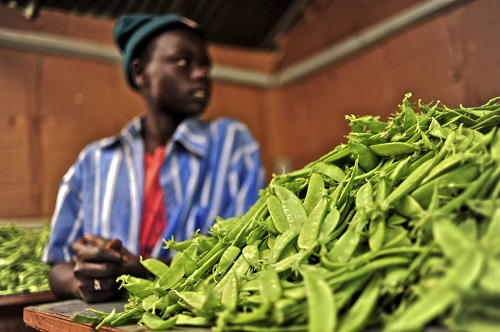CIAT photo
By
Cynthia Meru
Historians have argued: in the Colonial era, the white settlers first took the land and then the youth to work on the land. They claimed that true wealth was in the soil. My African culture recognizes and encourages land inheritance; therefore, a child is entitled to a piece of his father’s land. Youth are wealthy; we have a commodity that gives us the power to create employment opportunities for the community and ourselves, we must treasure and protect our land by choosing smart farming.
Smart Farming? We live in an era, where information is readily accessible at our fingertips. Therefore, your choice of farming can be specific and unique, measurable; use materials that are locally available and assignable, realistic and time-bound. Private and government research institutions (KARI, KESREF, and WWF) publish information, pictorials, new techniques and trends on matters agriculture and agro-business. These publications are readily and some freely accessed by the public and with the use of internet the information is a finger click away! With the new media, YouTube, you can freely access video tutorials on how to step by step (inception to conclusion) attend to a given species of plants, fruits and flowers and how to make sustainable green or farmyard manure. This enhances the capacity of the farmer through education with practical demonstrations.
What happens when I do not own land? Land lease laws in Kenya are flexible. You may argue that land is expensive. Well, you do not have to do it alone. Collaborate with like-minded friend(s) and consolidate needed resources for successful venture. Identify a friend who owns land and collaborate with him or her. Your partner may decide to offer his/her land and labour while you bring the other required identified resources such as seeds and pesticides, as agreed. Ensure during the collaboration, there is a legal representation/witness and a documented agreement signed by involved parties to avoid future land disputes and disagreement. Furthermore, with a well-documented agro-business plan, you can easily access financial loans, grants and funds set aside by the government, banks and private sectors.
How do I sell the end produce? The market is dynamic: traditionally, you could take your produce to the market or door to door selling. Today, with the bigger percentage of youth owning smartphones and having access to various social media platforms: Facebook, Twitter, LinkedIn, Google+, YouTube, Instagram, Pinterest and Snapchat, with a massive virtual following, the possibilities are endless. The sites allow you to use words, GIFs, pictorials and videos; therefore, reaching diverse and large customers within a short time. Assuming you grow flowers (roses) and Valentines is approaching: You have 5,000 Facebook following, post a picture of a bouquet of roses with a caption “fresh roses for Ksh. 200 and free delivery in Nairobi”. Your sale margin by calculation, assuming your friends bought a bouquet each is over a million Kenya shilling indicating successful returns.
In conclusion, when young people embrace smart farming, land and environment conservation will be complementary to the creation of employment.
Cynthia Meru
I am a freelance writer and photographer and believe that everyone has the potential to do great things, all one needs is an opportunity. Favourite Quote: “Don’t be afraid of getting wet, if you want to be a swimmer.”



No Comments Yet!
You can be first to comment this post!